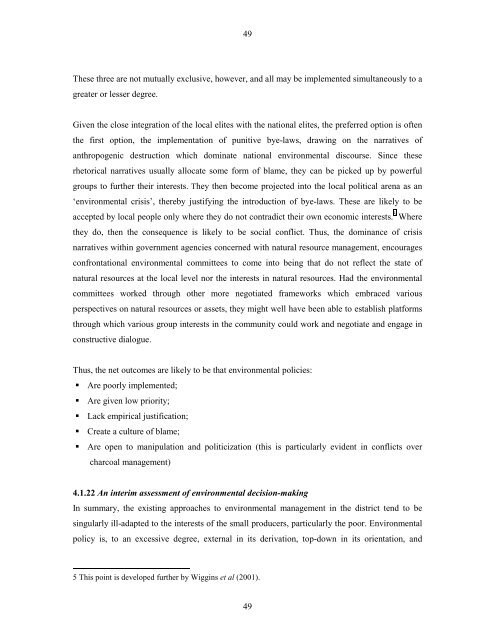Poverty Dimensions of Public Governance and Forest Management ...
Poverty Dimensions of Public Governance and Forest Management ...
Poverty Dimensions of Public Governance and Forest Management ...
You also want an ePaper? Increase the reach of your titles
YUMPU automatically turns print PDFs into web optimized ePapers that Google loves.
49<br />
These three are not mutually exclusive, however, <strong>and</strong> all may be implemented simultaneously to a<br />
greater or lesser degree.<br />
Given the close integration <strong>of</strong> the local elites with the national elites, the preferred option is <strong>of</strong>ten<br />
the first option, the implementation <strong>of</strong> punitive bye-laws, drawing on the narratives <strong>of</strong><br />
anthropogenic destruction which dominate national environmental discourse. Since these<br />
rhetorical narratives usually allocate some form <strong>of</strong> blame, they can be picked up by powerful<br />
groups to further their interests. They then become projected into the local political arena as an<br />
‘environmental crisis’, thereby justifying the introduction <strong>of</strong> bye-laws. These are likely to be<br />
accepted by local people only where they do not contradict their own economic interests. 5 Where<br />
they do, then the consequence is likely to be social conflict. Thus, the dominance <strong>of</strong> crisis<br />
narratives within government agencies concerned with natural resource management, encourages<br />
confrontational environmental committees to come into being that do not reflect the state <strong>of</strong><br />
natural resources at the local level nor the interests in natural resources. Had the environmental<br />
committees worked through other more negotiated frameworks which embraced various<br />
perspectives on natural resources or assets, they might well have been able to establish platforms<br />
through which various group interests in the community could work <strong>and</strong> negotiate <strong>and</strong> engage in<br />
constructive dialogue.<br />
Thus, the net outcomes are likely to be that environmental policies:<br />
! Are poorly implemented;<br />
! Are given low priority;<br />
! Lack empirical justification;<br />
! Create a culture <strong>of</strong> blame;<br />
! Are open to manipulation <strong>and</strong> politicization (this is particularly evident in conflicts over<br />
charcoal management)<br />
4.1.22 An interim assessment <strong>of</strong> environmental decision-making<br />
In summary, the existing approaches to environmental management in the district tend to be<br />
singularly ill-adapted to the interests <strong>of</strong> the small producers, particularly the poor. Environmental<br />
policy is, to an excessive degree, external in its derivation, top-down in its orientation, <strong>and</strong><br />
5 This point is developed further by Wiggins et al (2001).<br />
49
















